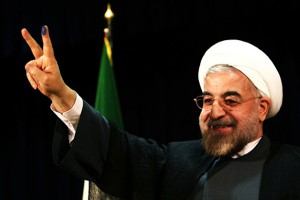In the country’s first national elections since the completion of a 2015 nuclear deal with world powers, relatively moderate forces aligned with President Hassan Rouhani claimed victory. Candidates said to be backed by reformists and moderates won at least 158 out of 290 seats in parliament (AP). Rouhani allies also won 59 percent of the Assembly of Experts (WSJ), including fifteen of sixteen possible seats in Tehran. The Assembly, an eighty-eight member clerical advisory council, is responsible for choosing a successor to the Supreme Leader Ayatollah Khamenei.
“After dominating parliament for 12 years, hardline politicians failed to win even one seat of the 30 available in the capital, Tehran. They were also roundly defeated in the experts assembly—made up of senior clerics—with all but one prominent hardliner trounced in the fight for Tehran’s 16 seats,” writes Najmeh Bozorgmehr in the Financial Times.
“[Ayatollah] Khamenei has a more difficult job. He has striven to maintain his grip on power, but can afford neither to eliminate republicanism—to which many of Iran’s founding fathers and technocrats adhere—nor sanction a drift in that direction,” writes Ali Vaez in Foreign Affairs.
“Iran’s president has proved himself an astute, hard-headed operator. He not only carried the bulk of the political class behind the nuclear agreement, he has again won electoral endorsement for his pragmatic conservatism. His politics are based on efforts to improve relations with other countries, including the United States,” argues Gareth Smyth in the Guardian.
cfr.org



